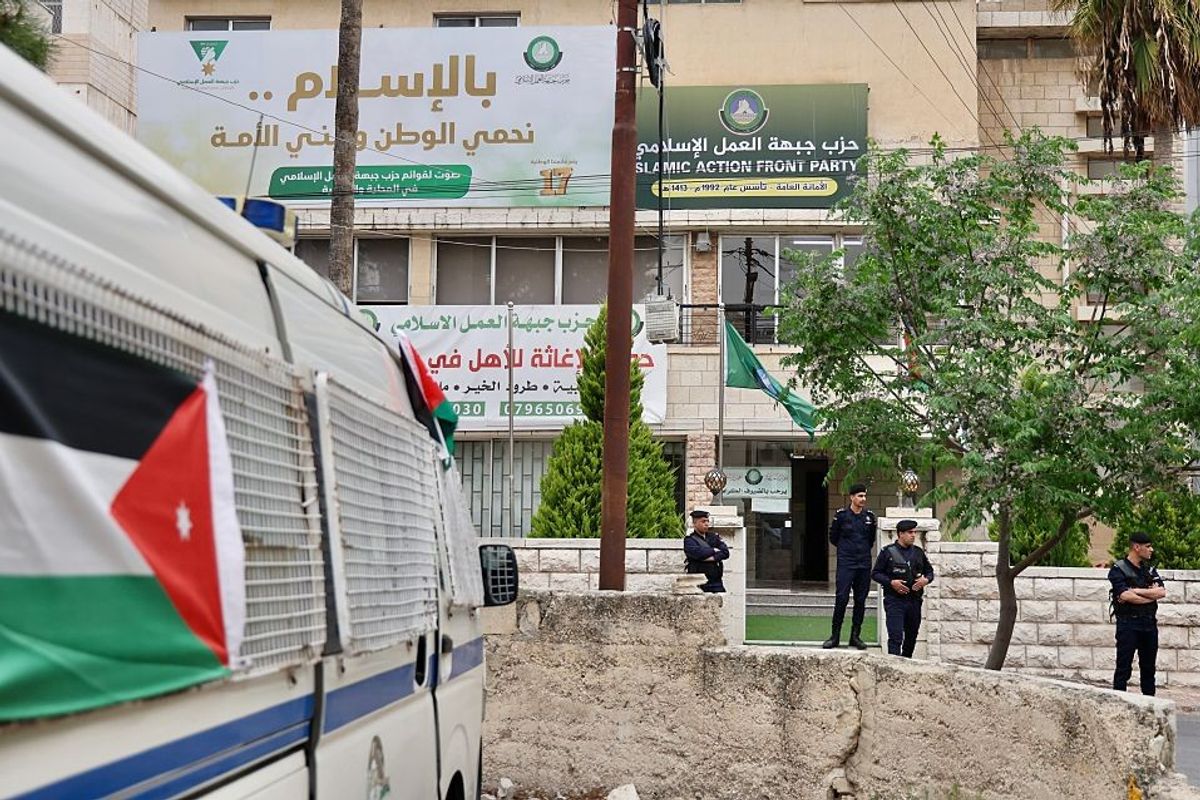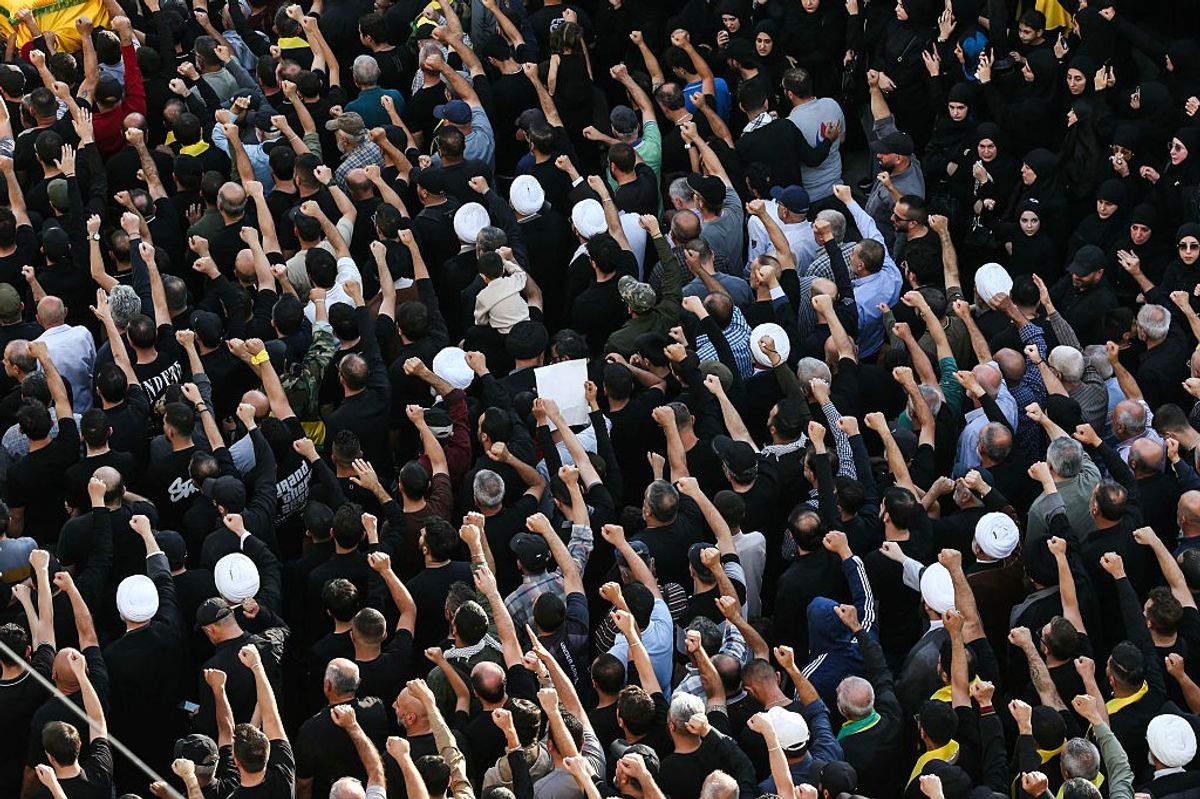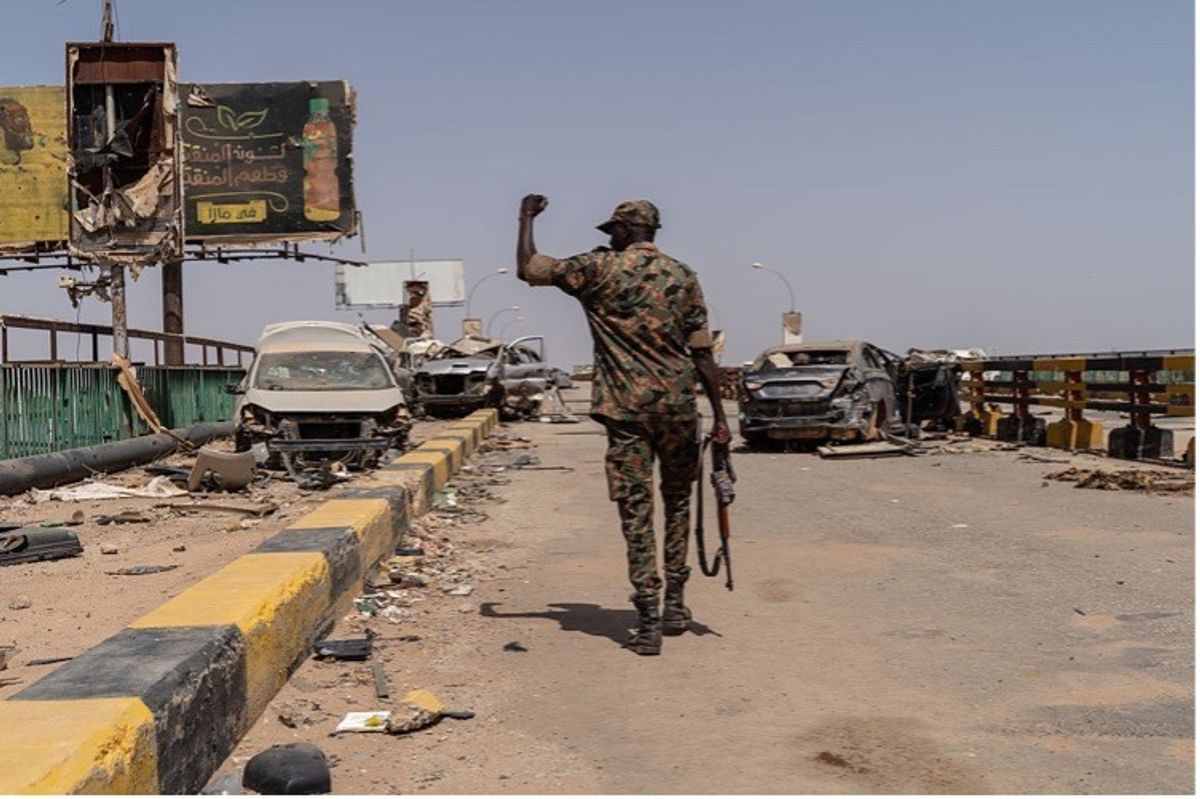BOTTOM LINE UP FRONT – On Tuesday, with Jordan’s King Abdullah II at his side, President Donald Trump exuded confidence that the Arab world will come around to support his plan for the U.S. to take over the Gaza Strip, and rebuild it into a glittering resort and business center.
“We're going to have it and we're going to keep it and we're going to make sure that there's going to be peace,” Trump told reporters in the Oval Office, “and there's not going to be any problem, and nobody's going to question it.” He added his belief that the two million Palestinians now living in Gaza will willingly depart for “a place where they're going to live very happily and very safely.”
For now, many people – including key figures in the region – are questioning Trump’s proposals, in particular his contention that they should be relocated to two of Israel’s neighbors. Trump spoke Tuesday about “a parcel of land in Jordan” and “a parcel of land in Egypt” that might be destinations for the refugees.
Jordan and Egypt are critical to the situation, and the region, for a number of reasons: both are long-time U.S. allies; both signed peace agreements with Israel decades ago; and they serve as linchpins in terms of Middle East security generally.
The two nations have received billions of dollars in U.S. military and economic aid, and they are in line for billions more, if the U.S. honors existing bilateral agreements made under previous administrations.
In the week since President Trump first broached his ideas for Gaza, both countries have balked at taking on more Palestinian refugees. Egypt suffers from a weak economy and chronic overpopulation, and Jordan is already home to the world's largest Palestinian diaspora, with an estimated 2.4 million Palestinian residents. Jordanian leaders have argued that bringing in a large new influx of Palestinians would prove destabilizing.
At the White House Tuesday, Trump hinted at the leverage the U.S. holds as a donor to both countries. “We contribute a lot of money to Jordan and to Egypt, by the way, a lot to both, but I don't have to threaten that,” the President said. “There's a great sense of wanting to help the Palestinians. There's a lot of good countries out there, people that rule those countries with big hearts and this gentleman [King Abdullah] is at the top of the list.”
King Abdullah demurred when asked about President Trump’s plans for Gaza, saying he expects Trump to host a meeting in Washington with “a group of us Arabs here to discuss the overall plan.” In a statement posted after the meeting, the King reiterated "Jordan’s steadfast position against the displacement of Palestinians in Gaza and the West Bank...Rebuilding Gaza without displacing the Palestinians, and addressing the dire humanitarian situation should be the priority for all.”
THE CONTEXT
- In 2022, the U.S. and Jordan signed their latest memorandum of understanding, with a seven-year agreement that committed the U.S. to provide Jordan with $1.45 billion in annual military and economic aid, subject to Congressional appropriations; last year, Congress approved a bill that included $1.45 billion in aid to Egypt, $1.3 billion of which was for weapons. According to the Congressional Resource Service, Egypt has received nearly $90 billion in bilateral foreign aid since 1946, the bulk of those funds since it signed the 1979 Camp David accords with Israel.
- There are more than two million registered Palestinian refugees in Jordan. These include Palestinians who fled during the 1948 Arab-Israeli War and the 1967 Six Day War, as well as their descendants.
- Tensions between the Jordanian government and the Palestine Liberation Organization (PLO), which operated autonomously in Jordan, erupted into a civil war in September 1970, known as Black September. The PLO resented the control of King Hussein and sought to overthrow him. The conflict ended with Jordan expelling the PLO to Lebanon. Many Palestinians were integrated into Jordan with full citizenship.
- Egypt took control of Gaza after the 1948 Arab-Israeli War until Israel occupied the territory in the 1967 Six-Day War.
- President Donald Trump has proposed the U.S. “take over” Gaza and hold a “long-term ownership position” to rebuild the territory. Under his plan, Palestinians currently living in Gaza would relocate elsewhere permanently. He has suggested Jordan and Egypt would take Gaza’s Palestinians, in part becausethe U.S. gives these countries “billions and billions of dollars a year.”
- The Jordanian government says it rejects any displacement of Palestinians.
- Egyptian President Fatah el-Sisi has warned that moving Palestinians away from Gaza would be a “red line” that would threaten Egyptian security and potentially start a war with Israel, referring to concerns that an expulsion of Palestinians to the Sinai Peninsula might make the area a staging ground for militants to launch attacks into Israel.
The Cipher Brief spoke with Beth Sanner, former Deputy Director of National Intelligence at ODNI; Norman Roule, former National Intelligence Manager for Iran at ODNI; Ambassador Gary Grappo, former U.S. Ambassador to Oman; and Ambassador Dennis Ross, a longtime Middle East negotiator who served as special assistant to President Barack Obama, about how Jordan and Egypt factor into President Trump’s plans for the future of Gaza. Our interviews have been edited for length and clarity.
THE EXPERTS
Ambassador Ross: We've seen that President Trump doesn't mind upsetting the apple cart. He doesn't mind coming with, how should we say it, a very strong demand. He is certainly hearing from the Egyptians, Jordanians, the Saudis, the Emiratis and the Qataris that this is not something that they can accept because it goes too much against the narrative in the region. But his approach to them should be, OK, if you don't like what I've offered, come with something that's realistic. Come with an approach on reconstruction. Come with an approach on the day-after administration in Gaza that doesn't leave Hamas in power and makes reconstruction possible.
[Jordan's] King Abdullah should be talking about what he's prepared to do. To be fair, the Jordanians have field hospitals in Gaza. They can extend the security perimeter around it. Egypt obviously is the key to everything that comes in and out of Gaza. The Saudis and the Emiratis, certainly in the case of the Emiratis, have made it clear they were prepared to commit to a stabilization force to be part of it. There’s an Arab quint, which is Egypt, Jordan, Saudi Arabia, the Emirates and Qatar. What they should do is they should come up with a common approach and even lay out a division of labor among them — who will do what, and how that will contribute to what comes next in Gaza.
The more practical that approach, the less it's geared towards general statements [the better]. Here's what we're going to do in terms of bringing security contractors in to make sure humanitarian assistance gets securely distributed to the people who need it; here's what we're prepared to do in terms of helping set up a transitional administration for Gaza without Hamas, because we understand there's no reconstruction if Hamas is still in control; here's what we're prepared to do in terms of resuming commercial activity there; here's what we're prepared to do in terms of rehabilitating some of the infrastructure.
And to be fair to them, they can say to President Trump, "Here are the things you could do to make it easier for us to take those steps." Now you're talking about an important dialogue that actually offers to change the reality and isn't just an exchange of platitudes back and forth.
If I were the [Egyptians or Jordanians] coming and speaking to the president, I would say, "OK, what are you going to do on bomb disposal in Gaza? What are you going to do in terms of getting electricity and water up and running? What are you going to do as it relates to rebuilding roads? We'll work with you, but what are you going to do?"
We don't have answers to any of that. We have a very broad concept, but we don't have a clear picture of what we're going to do. That certainly puts the Arabs in a position where they have a right to ask certain questions about how are we going to approach this practically. We have to get the Arabs to come here and not focus on platitudes, not focus on slogans, but they have a right to ask us, "OK, what are you going to do practically?"
Sanner: The President’s words alone may have sparked a momentum that is likely to destabilize Israel’s neighbors, Jordan and Egypt, and Israel itself. The President and his advisors have walked back some aspects of the plan; Trump said he is in no hurry to implement his plan, which in any case would require no U.S. boots on the ground or even any U.S. investment. Other advisers and even Netanyahu himself have suggested that removed Palestinians would be allowed back if they disavowed terrorism.
Perhaps these clarifications might provide some relief to Jordan’s King Abdullah, allowing him to kick the can down the road. But combined with dramatic cuts in U.S. assistance to the aid-dependent country, Jordan will emerge more fragile regardless. During his visit to the White House, Abdullah faced the unenviable task of telling President Trump that he is wrong. Trump has said that Jordan–and Egypt– will come around and accept Gazans because “we give them a lot.” Well, the U.S. is giving a lot less now. Some $1.45 billion in annual military and development assistance to Jordan has been frozen or ended, along with the stoppage of U.S. funds to the UN relief organization UNRWA that has supported Palestinian refugees in Jordan for decades. Despite the strains that this will cause, it is unlikely that Abdullah can accept a quid pro quo to accept Gazans in exchange for turning the aid back on; the alternative is worse.
Simply put, accepting Palestinian refugees from Gaza threatens the very existence of Jordan, upending the fragile balance between East Bank Arab tribes and the Palestinians who outnumber them. Such an existential threat is in the living memory of many Jordanians. In 1970, in the wake of the expulsion of Palestinians to Jordan during the 1967 Arab-Israeli war, Yasser Arafat and his Palestinian Liberation Organization attempted to overthrow Abdullah’s father, King Hussein. The country barely survived the ensuing short but bloody civil war, dubbed “Black September,” which drew in neighboring countries and the deployment of two U.S. aircraft carriers, ultimately leading to the forced expulsion of the Palestinian militants into Lebanon.
If pushed and with few options to stop Trump’s plan, Jordan’s strained relations with Israel may erupt. Its security establishment has drawn up contingency plans ranging from declaring a state of war with Israel, to abrogating the Jordan-Israel peace treaty, to declaring a state of emergency.
Similarly, Egyptian President el-Sisi has declared Trump’s plan a threat to Egypt’s national security and on Sunday he called for an emergency Arab League meeting in Cairo to discuss “new and dangerous developments for the Palestinian cause.” Earlier in Israel’s war against Hamas, Sisi described the expulsion of Gazans to Egypt as a “red line” that would force Egypt to suspend its peace treaty with Israel and potentially reignite war between Egypt and Israel. As in the case of Jordan, the influx of Palestinians poses a direct threat to Sisi’s fragile rule; it is universally and vehemently opposed by Egypt’s already deeply discontented public, and some insiders say any acquiescence could prompt a coup.
Roule: If you ask who could provide an economic impact for Gaza, that’s going to be people with capital to spare. So, we’re talking about the Gulf Arabs. And the history between the Palestinians and the Gulf Arabs is complicated. The Palestinian PLO stood with Saddam Hussein during the invasion of Kuwait. The corruption of Palestinian institutions has riled Gulf leaders, and as generous as they are, I don’t think they’re in the mood to throw away money on doomed projects, corrupt environments, or to sustain an Iranian proxy that would rise in the ashes of Gaza. If you mean politically, Egypt and Jordan play large roles in shaping the Palestinian narrative.
This needs to be an Arab solution to an Arab problem. The definition of the Palestinian government and how they manage themselves, that’s a Palestinian matter in which we should have only modest say in terms of anti-corruption efforts, anti-terrorism efforts, et cetera. But beyond that, we need to shuffle the diplomatic deck. We need a different path to move forward.
There are valid reasons why this is very challenging. It would be difficult for the Jordanians and the Egyptians to absorb Palestinians who are currently living in Gaza. But the Palestinian people need themselves to say that they’re in support of a very different future. And I think what may be missing from this dynamic is that you have plenty of Palestinian voices saying this is a bad idea. Some of those are forged by Hamas, but the Palestinian voices who aren’t speaking, what do they want to do? Leaving a million and half people in rubble in conditions that six months ago, we said were inhumane means we need some urgent, decisive thinking and it will have to reshuffle the deck. We’ll need some new approaches to this. None of them will be easy. Nothing is easy in the Middle East.
Ambassador Grappo: The one real leverage that [Trump] has is that both [Egypt and Jordan] receive substantial aid from the United States. And in both cases, these address both security needs of these two countries as well as some of their economic needs. Now, on the economic side, I suspect that aid may be in question anyway, given the actions that the U.S. has taken with regard to USAID assistance and development programming around the world. But nevertheless, President Trump does have that leverage. Both of these countries are highly dependent on it – in particular, Jordan. And so if he uses that, he will make this decision for both leaders very, very difficult.
On the other hand, there is no question about where the Egyptian people and the Jordanian people stand on this issue. They simply will not accept it.
Something that's not been said and needs to be taken into account is that in the case of Jordan, we already have a country that has this ethnic fault line that runs through the country. Between 70 and 80 % of the population of Jordan is already Palestinian, either those who settled there after 1948 or their descendants and those who left their homes in the West Bank in 1967. And so you have a very large population, which has always been quite restive and problematic for King Hussein, King Abdullah's father, and now King Abdullah himself. The last thing he wants to do is to add gasoline to that very difficult ethnic situation that he must constantly be aware of and address. I would not be surprised if we see Arabs taking to the street in Jordan in a very short while.
And in the case of Egypt, they have their economic challenges too, and compounding that with the presence of large numbers of resettled Palestinians who are going to be looking for work, who need to make claims on resources that Egypt does not have to help get them settled.
So neither of these countries is in a position, whether real, political or economic, to accept these proposals.
The last point I'll make is that the history of Palestinians in other countries outside of the West Bank or Gaza is not a good one. I would just cite the example of Jordan, and the Black September movement in the early 1980s. And the Palestinians were transplanted to southern Lebanon in the early 80s. We saw a civil war erupt largely because of the presence of Palestinians. And then of course, the Palestinians who had been present and living peacefully and very successfully and prosperously in Kuwait, who were expelled after Saddam's invasion of Kuwait in the early 1990s. So it's just something that I don't think any Arab leader is going to seriously contemplate.
Elaine Shannon contributed reporting.
Read more expert-driven national security insights, perspective and analysis in The Cipher Brief













